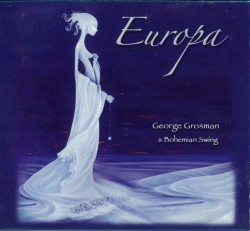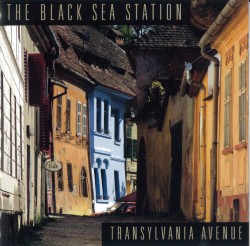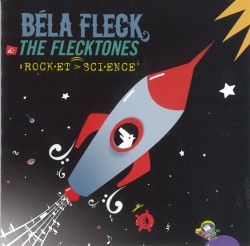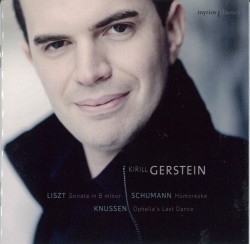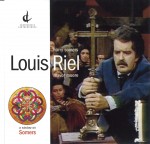EDITOR’S CORNER - September 2011
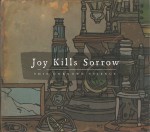 About a year ago in this column I raved about hearing American string band Joy Kills Sorrow at Hugh’s Room and their “Darkness Sure Becomes This City” which has since stayed in regular rotation on my stereo throughout the past year. Their sophomore release This Unknown Science (Signature Sounds SIG 2041 www.signaturesounds.com) has rarely been far from the CD player since arriving on my desk last month. Whereas the previous outing was squarely rooted in the “new grass” camp with its busy mandolin, banjo, flat-picking guitar and plucked bass arrangements, this new disc incorporates that sensibility into a broader approach encompassing indie-rock and new folk (the genre from which Canadian lead singer Emma Beaton originates). While my initial response to the introspective and generally more subdued material was disappointment, repeated listening has easily changed my mind and I find a number of the haunting new songs – in particular When I Grow up (…I’ll get better) and the strangely disturbing Somewhere over the Atlantic in which the protagonist dreams of plane crashes and finds comfort from the fact that she will be “sleeping on the ocean floor” - pursuing me through my days. The instrumentation on this album has expanded too, with Beaton adding cello and bass-player, chief song-writer Bridget Kearney, using a bow with some frequency (and agility) and also adding piano and organ to the mix. This is not to say that there are no up tempo, good-time numbers – One More Night is a case in point – and even the slow melodies are often laid over fast, rhythmic accompaniments. In spite of my hankering for “more of the same” in this new release I congratulate these young artists for the growth shown here and for not resting on their laurels. Concert Note: I’m very pleased to say that Joy Kills Sorrow will return to Hugh’s Room on September 20. I’ll be there with bells on.
About a year ago in this column I raved about hearing American string band Joy Kills Sorrow at Hugh’s Room and their “Darkness Sure Becomes This City” which has since stayed in regular rotation on my stereo throughout the past year. Their sophomore release This Unknown Science (Signature Sounds SIG 2041 www.signaturesounds.com) has rarely been far from the CD player since arriving on my desk last month. Whereas the previous outing was squarely rooted in the “new grass” camp with its busy mandolin, banjo, flat-picking guitar and plucked bass arrangements, this new disc incorporates that sensibility into a broader approach encompassing indie-rock and new folk (the genre from which Canadian lead singer Emma Beaton originates). While my initial response to the introspective and generally more subdued material was disappointment, repeated listening has easily changed my mind and I find a number of the haunting new songs – in particular When I Grow up (…I’ll get better) and the strangely disturbing Somewhere over the Atlantic in which the protagonist dreams of plane crashes and finds comfort from the fact that she will be “sleeping on the ocean floor” - pursuing me through my days. The instrumentation on this album has expanded too, with Beaton adding cello and bass-player, chief song-writer Bridget Kearney, using a bow with some frequency (and agility) and also adding piano and organ to the mix. This is not to say that there are no up tempo, good-time numbers – One More Night is a case in point – and even the slow melodies are often laid over fast, rhythmic accompaniments. In spite of my hankering for “more of the same” in this new release I congratulate these young artists for the growth shown here and for not resting on their laurels. Concert Note: I’m very pleased to say that Joy Kills Sorrow will return to Hugh’s Room on September 20. I’ll be there with bells on.
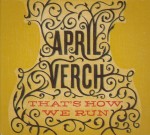 I find it almost strange that Joy Kills Sorrow does not have a fiddler in the band, although they are none the worse for that. But perhaps that is one reason I was so pleased to receive, around the same time as their new disc, That’s How We Run, the latest from Ottawa Valley fiddler extraordinaire April Verch (Slab Town Records STR11-01 www.aprilverch.com). Verch, the first woman in history to win both of Canada’s most prestigious fiddle championships, the Grand Masters and Canadian Open, is renowned as a performer of traditional Canadian music. She has branched out in this latest release which was recorded in North Carolina and mastered in Colorado and here embraces the musical traditions of our neighbour to the south. Although there are several traditional old-timey tunes and such writers as Lester Flatt are represented, most of the 17 tracks were composed by April Verch in the styles of Appalachia, the Ozarks, the Mid-Western States and Louisiana. Her scratchy descant vocals are particularly well suited to the medium and the claw-hammer banjo accompaniment on many songs is very effective. There’s plenty to tap your toes to too, not to mention the stellar fiddling!
I find it almost strange that Joy Kills Sorrow does not have a fiddler in the band, although they are none the worse for that. But perhaps that is one reason I was so pleased to receive, around the same time as their new disc, That’s How We Run, the latest from Ottawa Valley fiddler extraordinaire April Verch (Slab Town Records STR11-01 www.aprilverch.com). Verch, the first woman in history to win both of Canada’s most prestigious fiddle championships, the Grand Masters and Canadian Open, is renowned as a performer of traditional Canadian music. She has branched out in this latest release which was recorded in North Carolina and mastered in Colorado and here embraces the musical traditions of our neighbour to the south. Although there are several traditional old-timey tunes and such writers as Lester Flatt are represented, most of the 17 tracks were composed by April Verch in the styles of Appalachia, the Ozarks, the Mid-Western States and Louisiana. Her scratchy descant vocals are particularly well suited to the medium and the claw-hammer banjo accompaniment on many songs is very effective. There’s plenty to tap your toes to too, not to mention the stellar fiddling!
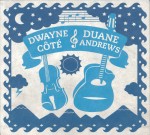 It is a bit unusual to find an award-winning guitarist from Newfoundland who has devoted his energy to developing in Django Reinhardt’s style and technique. On his latest CD Duane Andrews is joined by violinist Dwayne Côté (www.duaneandrews.ca and www.dwaynecote.com) for an outing that pays tribute to the heyday of the Hot Club of France when Reinhardt performed with Stéphane Grappelli, interspersed with traditional Scottish and East Coast melodies, jigs and reels. Dwayne & Duane each contribute a couple of original compositions, although these too are couched in the language of tradition. Andrews’ The Chocolatier’s Lament is so convincing in its Reinhardt stylings I could swear I’ve heard it before, played by the master himself. My only quibble with the recording is that Côté’s occasional pizzicato accompaniments to the guitar are not very effective. That said this is still a superior and invigorating adventure and the swing arrangement of Hank Snow’s hit A Fool such as I (written by Bill Trader) makes a wonderful closer.
It is a bit unusual to find an award-winning guitarist from Newfoundland who has devoted his energy to developing in Django Reinhardt’s style and technique. On his latest CD Duane Andrews is joined by violinist Dwayne Côté (www.duaneandrews.ca and www.dwaynecote.com) for an outing that pays tribute to the heyday of the Hot Club of France when Reinhardt performed with Stéphane Grappelli, interspersed with traditional Scottish and East Coast melodies, jigs and reels. Dwayne & Duane each contribute a couple of original compositions, although these too are couched in the language of tradition. Andrews’ The Chocolatier’s Lament is so convincing in its Reinhardt stylings I could swear I’ve heard it before, played by the master himself. My only quibble with the recording is that Côté’s occasional pizzicato accompaniments to the guitar are not very effective. That said this is still a superior and invigorating adventure and the swing arrangement of Hank Snow’s hit A Fool such as I (written by Bill Trader) makes a wonderful closer.
We welcome your feedback and invite submissions. CDs and comments should be sent to: The WholeNote, 503 – 720 Bathurst St. Toronto ON M5S 2R4.
David Olds
DISCoveries Editor
discoveries@thewholenote.com


